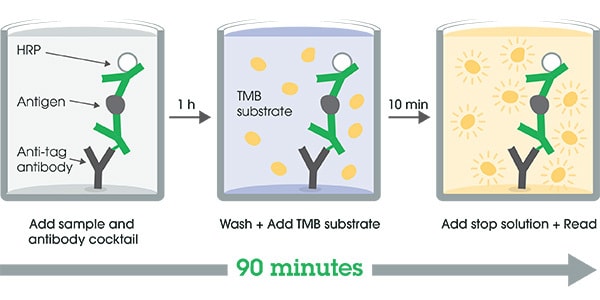Rat Cystatin C ELISA Kit (ab201281)
Key features and details
- One-wash 90 minute protocol
- Sensitivity: 11.72 pg/ml
- Range: 23.4 pg/ml - 1500 pg/ml
- Sample type: Cell culture supernatant, Cit plasma, EDTA Plasma, Serum, Tissue Extracts
- Detection method: Colorimetric
- Assay type: Sandwich (quantitative)
- Reacts with: Rat
Overview
-
Product name
Rat Cystatin C ELISA Kit
See all Cystatin C kits -
Detection method
Colorimetric -
Precision
Intra-assay Sample n Mean SD CV% Cystatin C 8 2.95% Inter-assay Sample n Mean SD CV% Cystatin C 3 3.52% -
Sample type
Cell culture supernatant, Serum, Tissue Extracts, EDTA Plasma, Cit plasma -
Assay type
Sandwich (quantitative) -
Sensitivity
11.72 pg/ml -
Range
23.4 pg/ml - 1500 pg/ml -
Recovery
Sample specific recovery Sample type Average % Range Serum 113 111% - 114% Cell culture media 110 107% - 116% EDTA Plasma 115 108% - 119% Cit plasma 112 109% - 116% -
Assay time
1h 30m -
Assay duration
One step assay -
Species reactivity
Reacts with: Rat
Does not react with: Cow, Pig -
Product overview
Rat Cystatin C ELISA Kit (ab201281) is a single-wash 90 min sandwich ELISA designed for the quantitative measurement of Cystatin C protein in cell culture supernatant, cit plasma, edta plasma, serum, and tissue extracts. It uses our proprietary SimpleStep ELISA® technology. Quantitate Rat Cystatin C with 11.72 pg/ml sensitivity.
SimpleStep ELISA® technology employs capture antibodies conjugated to an affinity tag that is recognized by the monoclonal antibody used to coat our SimpleStep ELISA® plates. This approach to sandwich ELISA allows the formation of the antibody-analyte sandwich complex in a single step, significantly reducing assay time. See the SimpleStep ELISA® protocol summary in the image section for further details. Our SimpleStep ELISA® technology provides several benefits:
- Single-wash protocol reduces assay time to 90 minutes or less
- High sensitivity, specificity and reproducibility from superior antibodies
- Fully validated in biological samples
- 96-wells plate breakable into 12 x 8 wells stripsA 384-well SimpleStep ELISA® microplate (ab203359) is available to use as an alternative to the 96-well microplate provided with SimpleStep ELISA® kits.
-
Notes
Cystatin C, which belongs to the type II cystatin gene family, is a potent inhibitor of lysosomal proteinases. It is expressed in many organs of the body, and is an important extracellular inhibitor of cysteine proteases. As an inhibitor of cysteine proteinases, this protein is thought to serve an important physiological role as a local regulator of this enzyme activity.
Abcam has not and does not intend to apply for the REACH Authorisation of customers’ uses of products that contain European Authorisation list (Annex XIV) substances.
It is the responsibility of our customers to check the necessity of application of REACH Authorisation, and any other relevant authorisations, for their intended uses. -
Platform
Microplate
Properties
-
Storage instructions
Store at +4°C. Please refer to protocols. -
Components 1 x 96 tests 10X Rat Cystatin C Detector Antibody 1 x 600µl 10X Wash Buffer PT (ab206977) 1 x 20ml 50X Cell Extraction Enhancer Solution (ab193971) 1 x 1ml 5X Cell Extraction Buffer PTR (ab193970) 1 x 10ml Antibody Diluent CP 1 x 6ml Plate Seals 1 unit Rat Cystatin C Capture Antibody (lyophilized) 1 vial Rat Cystatin C Lyophilized Recombinant Protein 2 vials Sample Diluent NS (ab193972) 1 x 50ml SimpleStep Pre-Coated 96-Well Microplate (ab206978) 1 unit Stop Solution 1 x 12ml TMB Development Solution 1 x 12ml -
Research areas
-
Function
As an inhibitor of cysteine proteinases, this protein is thought to serve an important physiological role as a local regulator of this enzyme activity. -
Tissue specificity
Expressed in submandibular and sublingual saliva but not in parotid saliva (at protein level). Expressed in various body fluids, such as the cerebrospinal fluid and plasma. Expressed in highest levels in the epididymis, vas deferens, brain, thymus, and ovary and the lowest in the submandibular gland. -
Involvement in disease
Amyloidosis 6
Macular degeneration, age-related, 11 -
Sequence similarities
Belongs to the cystatin family. -
Post-translational
modificationsThe Thr-25 variant is O-glycosylated with a core 1 or possibly core 8 glycan. The signal peptide of the O-glycosylated Thr-25 variant is cleaved between Ala-20 and Val-21. -
Cellular localization
Secreted. - Information by UniProt
-
Alternative names
- AD 8
- AD8
- Amyloid angiopathy and cerebral hemorrhage
see all -
Database links
- Entrez Gene: 25307 Rat
- SwissProt: P14841 Rat
- Unigene: 106351 Rat
Images
-
SimpleStep ELISA technology allows the formation of the antibody-antigen complex in one single step, reducing assay time to 90 minutes. Add samples or standards and antibody mix to wells all at once, incubate, wash, and add your final substrate. See protocol for a detailed step-by-step guide.
-
Standard curve comparison between rat Cystatin C SimpleStep ELISA® kit and traditional ELISA kit from leading competitor. SimpleStep ELISA kit shows comparable sensitivity.
-
Background-subtracted data values (mean +/- SD) are graphed.
-
The 1X dilution was 0.2% for serum, and 0.4% for citrate and EDTA plasma. Interpolated data values (mean +/- SD, n = 2) are graphed.
-
The 1X dilution for the brain extract was an extract load of 15.6 µg/mL, and a load of 125 µg/mL for the heart extract.
-
To learn more about the advantages of recombinant antibodies see here.














